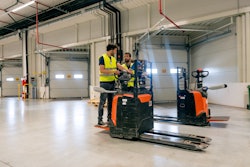What percent of commercial trucks on the road today are leased by private fleets? It might surprise you, but it’s almost an even split.
According to the 2023 National Private Truck Council Industry Benchmark Report, 49% of the Class 8 private fleet vehicle population is leased. Full-service leasing also represents 76% of all leasing types.
While some companies choose to lease all their trucks, others utilize a combination strategy of owned and leased trucks in their fleet. In fact, according to the NPTC Benchmark Survey, 30% report a combination of ownership and leasing as their heavy-duty acquisition strategy.
Full-service leasing is the simplest approach when it comes to truck management, maintenance, and cost predictability. With ownership, it’s harder to predict the maintenance costs over time. Beyond the initial purchase price, there are many variables. Let’s look below the ownership iceberg.
Below the iceberg of truck ownership
- Maintenance records and a maintenance system (MIS)
- Parts and inventory
- PM services
- Tires, rims, and casings
- Shop supplies
- Technicians, training, recruiting, payroll, and benefits
- Shop tools
- Facility
- Labor hours for additional repairs
- Emergency road service costs
- Towing
- Truck washing
- Computer equipment and diagnostic software
- Increasing delivery costs
On the other hand, a full-service lease can include all maintenance, licensing, fuel tax reporting, substitute vehicles, over-the-road service, and washing, simplifying costs and predictability. The lessor owns the asset for accounting and equity purposes. The lessee pays a monthly lease charge for the right to use the asset.
- It’s important to distinguish between a tax lease and a non-tax lease. In a tax lease, the equipment owner (lessor) receives the tax benefits (depreciation).
- Operating leases are considered tax leases.
- The payments made by the lessee are deductible for tax purposes. However, the depreciation is captured in the lease payments over the term.
Leasing is about paying for the use of the asset, not ownership. The lessee gives up certain ownership benefits but gains operational and financial benefits.
Key operational benefits of a full-service lease
- Timely maintenance and road service included (mitigates the iceberg of truck ownership)
- Technicians and training to “Trained, Certified Technicians”
- Broad network of locations
- Access to large, new rental fleet for truck replacement or expansion
- Tax reporting and administrative support
Key financial benefits
- Increases cash flow and conserves capital for other internal investments
- 100% financing – no down payment
- Can improve certain financial ratios
- Tax-deductible (check with your tax advisor for specifics)
- Fixed monthly payments eliminate variation in transportation costs
- Mitigates maintenance exposure
- Takes advantage of the purchasing power of the lessor
- Eliminates residual exposure and remarketing costs
- Reduces extra vehicle rental expenses
- Mitigates breakdown expenses and risk
Bundle it up?
The key to leasing is bundling all the services into one predictable lease payment, including depreciation and interest. Thus, if you unbundled all these services less the financing, you could predict costs. However, your costs may not be as low as the lessor. Remember, they have scale and receive preferred pricing, which is passed on to you (the lessee).
Net Present Value (NPV)
If you really want a good evaluation, perform a lease vs. own analysis (Net Present Value). Ask the leasing provider to do one for you. You will need to provide the financial and maintenance data to the lessor. They’ll supply the analysis. Each lessor may require different information or perform the analysis differently, but the output will be similar.
Maintenance processes and systems
Lessors are equipped and trained to handle truck maintenance in a cost-effective manner. They have scale and systemic processes set up to mitigate variation. Maintaining tens of thousands of trucks with years of predictive data is another advantage of working with a lessor. It’s their core competency.
Think about a fast-food franchise. Each one is the same. With PacLease, for example, you get the same service at every location. What you experience in Nashville, Tennessee, is like what you experience in Dallas, Texas. If you have multiple locations, you can work with lessors who have national account teams. This provides additional structure.
With all the unknown costs associated with truck ownership, full-service leasing continues to be a viable option for fleets seeking stability and efficient vehicle management.












